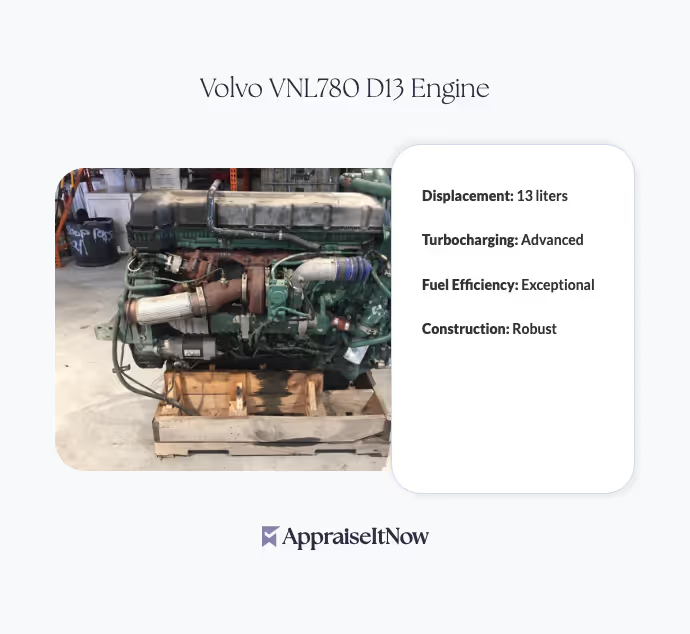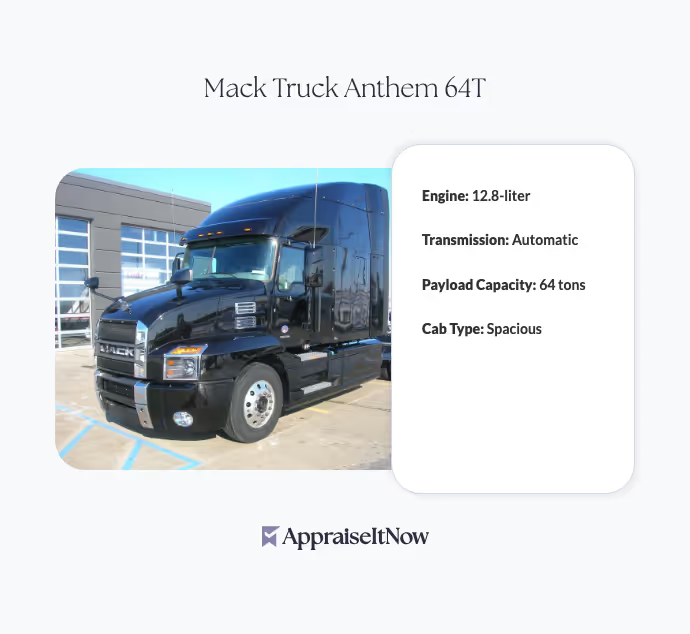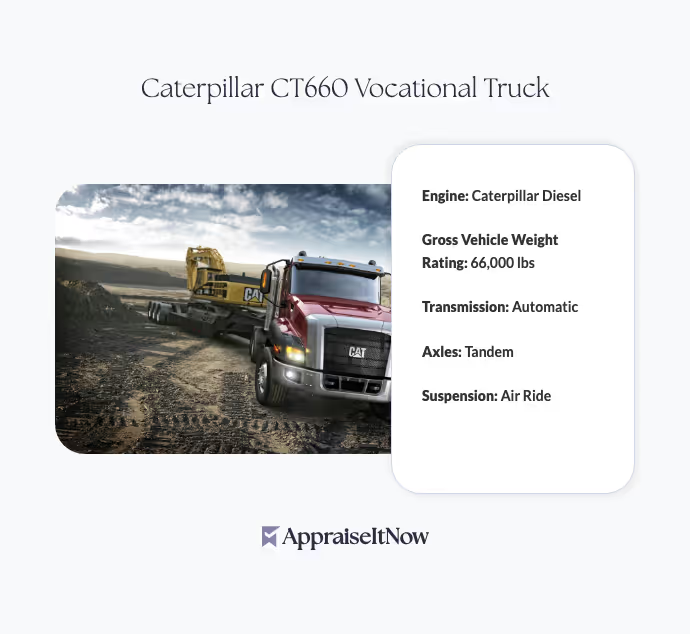<h1>How to Get Your Volvo VNL780 D13 Engine Appraised</h1>
<p>The Volvo VNL780 D13 Engine represents a significant capital investment for fleet operators and individual truck owners alike, commanding valuations between <strong>$45,000 and $65,000</strong> in today's commercial vehicle market. Whether you're evaluating this engine for insurance purposes, financing, resale, or operational planning, understanding how professional appraisals work ensures you receive accurate documentation and fair market assessment.</p>
<h2>Why Your Volvo D13 Engine Needs Professional Appraisal</h2>
<p>The D13 engine isn't simply a mechanical component—it's the heart of one of the most reliable <a href="/types/heavy-machinery">heavy-duty commercial vehicles</a> in the trucking industry. This 13-liter diesel powerhouse has become the standard for long-haul operations since its introduction in 2010, making accurate valuation essential for multiple business scenarios.</p>
<p>When you invest in a VNL780 D13, you're acquiring an engine engineered to Volvo's exacting standards, equipped with advanced turbocharging technology that delivers both power and fuel efficiency. Many fleet managers ask whether this investment will hold its value—the answer lies in comprehensive appraisal documentation. Professional appraisers help you understand your engine's specific worth based on current condition, market demand, and operational history.</p>
<div class="callout tip"><p><strong>Pro Tip</strong></p>
<p>Obtaining a certified appraisal before major financing decisions or insurance coverage changes protects your asset and ensures lenders and insurers have accurate replacement cost data.</p></div>
<h2>Key Factors That Determine Your D13 Engine's Value</h2>
<p>Understanding what influences your Volvo D13's market price helps you prepare for appraisal. The <strong>$45,000 to $65,000</strong> valuation range reflects several interconnected factors that professional appraisers evaluate systematically.</p>
<p><strong>Engine Hours and Operating History</strong> represents the first critical assessment point. Unlike automobiles measured in miles, commercial engines are evaluated by operational hours. An engine with 500,000 miles (typically 10,000-15,000 operating hours) differs substantially in value from one with 1,200,000 miles (25,000+ operating hours). Your maintenance records directly impact this evaluation—documented regular servicing increases value significantly compared to poorly maintained examples.</p>
<p><strong>Original Equipment Matching</strong> also matters considerably. Volvo D13 engines installed as original equipment in a VNL780 semi-truck carry different valuations than identical engines in alternative applications. Appraiser certification ensures proper matching and verification of all critical components.</p>
<p>The D13's proven reliability also affects its market positioning. When industry professionals consider "Is the Volvo D13 engine a good engine?", the answer influences broader fleet purchasing decisions that sustain demand for quality used units. This reputation translates directly into stronger appraisal values compared to engines with questionable track records.</p>
<div class="callout note"><p><strong>Market Insight</strong></p>
<p>Volvo D13 engines capable of achieving 13+ miles per gallon fuel efficiency command premium valuations in fleets where operational costs directly impact profitability.</p></div>
<h2>Understanding Volvo D13 Engine Life Expectancy</h2>
<p>A fundamental question that appraisers address concerns longevity: "What is the life expectancy of the D13 engine?" This answer shapes your asset's residual value significantly.</p>
<p>Quality Volvo D13 engines regularly exceed <strong>750,000 to 1,000,000 miles</strong> with proper maintenance—a lifespan that justifies the investment in well-maintained used units. Some engines reach 1.2 million miles or beyond, though diminishing returns occur as major overhauls become necessary. For comparison, understanding whether "Can a Volvo last 300,000 miles?" is somewhat misleading since these engines typically double or triple that benchmark with appropriate care.</p>
<p>Professional appraisers evaluate remaining useful life by examining maintenance records, operational hours, and service history. An engine approaching 600,000 miles with meticulous documentation may appraise higher than one with fewer miles but questionable maintenance practices. This distinction matters greatly when determining how much of your initial D13 investment remains recoverable through resale or trade-in.</p>
<div class="callout tip"><p><strong>Valuation Consideration</strong></p>
<p>Regular appraisals every 2-3 years track your engine's declining value and help justify maintenance expenditures that preserve asset worth longer.</p></div>
<h2>Commercial Engine Valuation vs. Automotive Appraisal</h2>
<p>The process of appraising your Volvo D13 differs significantly from standard <a href="/blog/what-is-an-automobile-appraisal">automobile appraisals</a>. Commercial engine valuations require specialists who understand heavy-duty <a href="/types/equipment-and-machinery">equipment and machinery</a> markets, industry standards, and the specific applications where these engines operate.</p>
<p>Commercial appraisers examine operational context—whether your engine powered primarily highway loads (less wear) or regional/vocational service (higher wear). They review engine serial numbers, verify factory specifications, and assess whether the unit retains original factory components or includes aftermarket modifications. These distinctions create substantial valuation differences that general automotive appraisers might overlook.</p>
<p>When seeking professional appraisal for your Volvo VNL780 D13, ensure your appraiser possesses certifications in <a href="/blog/the-basics-of-heavy-machinery-appraisal">heavy-machinery appraisal</a>. This specialization ensures accurate assessment of commercial diesel engines where industry-specific knowledge directly impacts valuation accuracy.</p>
<h2>Market Demand for Quality Volvo D13 Engines</h2>
<p>The question "Is the Volvo D13 engine a good engine?" resonates throughout the transportation industry, and the answer affects your asset's market value considerably. Fleet operators and independent truckers consistently rank the D13 among the top diesel engines available, creating steady demand for well-maintained used units.</p>
<p>When comparing D13 performance to alternatives like the Cummins DD15 and Paccar MX-13, industry professionals note that while each engine has distinct advantages, the Volvo D13 specifically excels in fuel efficiency and reliability—characteristics that preserve resale value. Whether your question is "Which engine is better, DD15 or DD13?" depends on specific operational requirements, but the D13's proven track record ensures demand remains strong in professional appraisal markets.</p>
<p>This sustained demand translates directly to your engine's appraisal value. Unlike specialized equipment with niche markets, Volvo D13 engines have broad application across long-haul operations, regional carriers, and owner-operator businesses. Professional appraisers leverage this market depth when determining fair value for your specific unit.</p>
<h2>Documentation Requirements for D13 Engine Appraisal</h2>
<p>Preparing your Volvo D13 for professional appraisal requires assembling specific documentation that appraisers need to establish accurate valuations. Your engine's service records represent the most critical document—maintenance receipts from Volvo-certified dealers or qualified service facilities carry substantially more weight than undocumented maintenance claims.</p>
<p>Essential documentation includes:</p>
<p>Volvo manufacturer records confirming original installation specifications and any recalls or service bulletins issued for your engine serial number. Maintenance logs documenting oil changes, filter replacements, and major services performed. Any major repairs or component replacements, with invoices confirming authorized parts and skilled labor. Fuel consumption records from fleet management systems showing actual MPG performance. Proof of original equipment status in your VNL780 semi-truck if applicable.</p>
<p>This documentation-first approach mirrors professional standards used in <a href="/types/business-assets">business asset appraisals</a>, where verifiable records establish baseline credibility for all valuations. Without proper documentation, appraisers must discount values to account for uncertainty regarding maintenance history and component condition.</p>
<div class="callout note"><p><strong>Documentation Tip</strong></p>
<p>Digital records and high-resolution photos of major service receipts provide immediate verification and accelerate the appraisal process significantly.</p></div>
<h2>The Role of D13 Engine Specifications in Valuation</h2>
<p>Your Volvo D13's technical specifications form the foundation of professional appraisal. The engine delivers approximately <strong>500+ horsepower</strong> and <strong>1,650 foot-pounds of torque</strong> depending on specific configuration, making it among the most powerful diesel options in its class. These performance characteristics, combined with advanced turbocharging technology, position it favorably in commercial vehicle markets.</p>
<p>Engine displacement matters as well—the D13's 13-liter capacity provides the displacement necessary for sustained power across varied operational scenarios. When industry participants wonder "Is the Volvo D13 engine a good engine?", they're often considering this reliable power delivery combined with fuel efficiency that achieves 13+ miles per gallon—performance matching or exceeding many competing options.</p>
<p>Professional appraisers verify engine displacement, confirm original factory horsepower ratings, and document any modifications that might affect value. An unmodified D13 with original specifications typically appraises higher than examples with aftermarket turbocharger upgrades or performance modifications, even if such modifications increase raw power output.</p>
<h2>Preparing Your Engine for Appraisal Inspection</h2>
<p>Before your professional appraiser arrives to evaluate your Volvo D13, appropriate preparation ensures efficient assessment and potentially improves final valuation. Clean the engine thoroughly to enable visual inspection of components and confirm absence of leaks or corrosion that might suggest underlying maintenance issues.</p>
<p>Compile all documentation in organized fashion—service records chronologically arranged, warranty information clearly marked, and any special maintenance performed by factory representatives highlighted. If your engine remains installed in the VNL780 semi-truck, ensure the vehicle is accessible for inspection and that fuel systems are full enough for potential operational testing if circumstances permit.</p>
<p>Address any obvious maintenance items like dirty air filters or low coolant levels before appraisal. These minor issues don't affect the engine's fundamental value but may prompt appraiser questions about overall maintenance diligence. Professional presentation of your asset demonstrates responsible stewardship and supports more favorable appraisal conclusions.</p>
<div class="callout tip"><p><strong>Inspection Preparation</strong></p>
<p>Digital documentation of your D13's installation location, serial number verification, and factory specifications accelerates the appraisal process significantly.</p></div>
<h2>Common Appraisal Questions About Volvo D13 Engines</h2>
<p>Professional appraisers frequently encounter specific questions about Volvo D13 engines that inform their valuation conclusions. Understanding these questions helps you anticipate what appraisers will investigate and prepare supporting documentation accordingly.</p>
<p><strong>How many miles per gallon does a Volvo D13 get?</strong> represents one critical inquiry. Actual fuel consumption varies significantly based on operational context—highway driving typically achieves 13+ miles per gallon while vocational or regional service may see 10-12 MPG. Your documented fuel consumption records demonstrate real-world performance versus theoretical specifications, influencing appraisal conclusions about engine condition and efficiency retention.</p>
<p><strong>What is the life expectancy of a Volvo Penta engine?</strong> occasionally arises from confusion between Volvo Trucks D13 engines and Volvo Penta marine powerplants, which follow different design and maintenance specifications. Professional appraisers clarify this distinction to ensure accurate market comparison and valuation methodology.</p>
<p><strong>What is the price of Volvo Penta D13 engine?</strong> similarly confuses different Volvo product lines. Your truck engine appraisal focuses specifically on the commercial D13 diesel configured for VNL780 and similar heavy-duty applications, not marine or stationary power generation variants.</p>
<p><strong>Is the D13 a Detroit engine?</strong> requires clear explanation—the D13 is a Volvo product utilizing Swedish engineering, distinct from Detroit Diesel Corporation engines like the DD15 or DD13. This distinction matters because fleet operators often evaluate Volvo and Detroit engines for different operational requirements, affecting their respective market values.</p>
<h2>Comparing Your D13 to Alternative Diesel Options</h2>
<p>Understanding how your Volvo D13 compares to other commercial diesel engines helps contextualize its market value within broader industry trends. When fleet managers ask "What are the top 3 diesel engines?", responses typically include the Volvo D13, Cummins X15, and Paccar MX-13—all capable performers with distinct operational characteristics.</p>
<p>The DD15 from Detroit Diesel and DD13 variants represent another common comparison point. While these engines serve comparable markets, the D13's fuel efficiency advantages and reputation for longevity often translate to stronger residual values in professional appraisal markets. Appraisers understand these comparative advantages when positioning your specific engine within current market pricing.</p>
<p>This comparative analysis ensures your $45,000-$65,000 valuation reflects realistic market conditions rather than optimistic pricing. Professional appraisers base valuations on comparable recent sales of similar engines in similar condition, applying industry-standard adjustment factors for operational hours, maintenance records, and market-specific demand variations.</p>
<h2>Insurance and Financing Implications of Professional Appraisal</h2>
<p>Obtaining a certified appraisal for your Volvo D13 carries implications beyond simple valuation—it directly affects insurance coverage and financing options available to you. Insurance carriers require documented asset values to establish appropriate replacement cost coverage, ensuring you maintain adequate protection without overpaying for unnecessary coverage limits.</p>
<p>Lenders and financial institutions similarly depend on professional appraisals when financing commercial vehicle purchases or refinancing existing equipment. A comprehensive appraisal report from certified professionals increases your credibility with financial decision-makers and may improve financing terms you qualify for. This documentation proves particularly valuable when your D13 represents significant collateral for commercial credit arrangements.</p>
<p>Professional appraisals also support tax planning and depreciation calculations for accounting purposes. Accurately documenting your engine's current market value enables proper depreciation expense calculation that reflects actual asset value retention. Consulting with qualified <a href="/types/business-assets">business asset</a> appraisers ensures your financial records maintain proper alignment with market reality.</p>
<div class="callout note"><p><strong>Key Takeaway</strong></p>
<p>A professional appraisal of your Volvo VNL780 D13 Engine provides certified documentation that protects your investment, supports accurate insurance coverage, and ensures financial institutions have reliable asset valuation for lending decisions. By understanding the factors influencing your engine's $45,000-$65,000 market value and preparing comprehensive documentation, you maximize the accuracy and utility of professional appraisal services that properly reflect your significant commercial asset.</p></div>
















